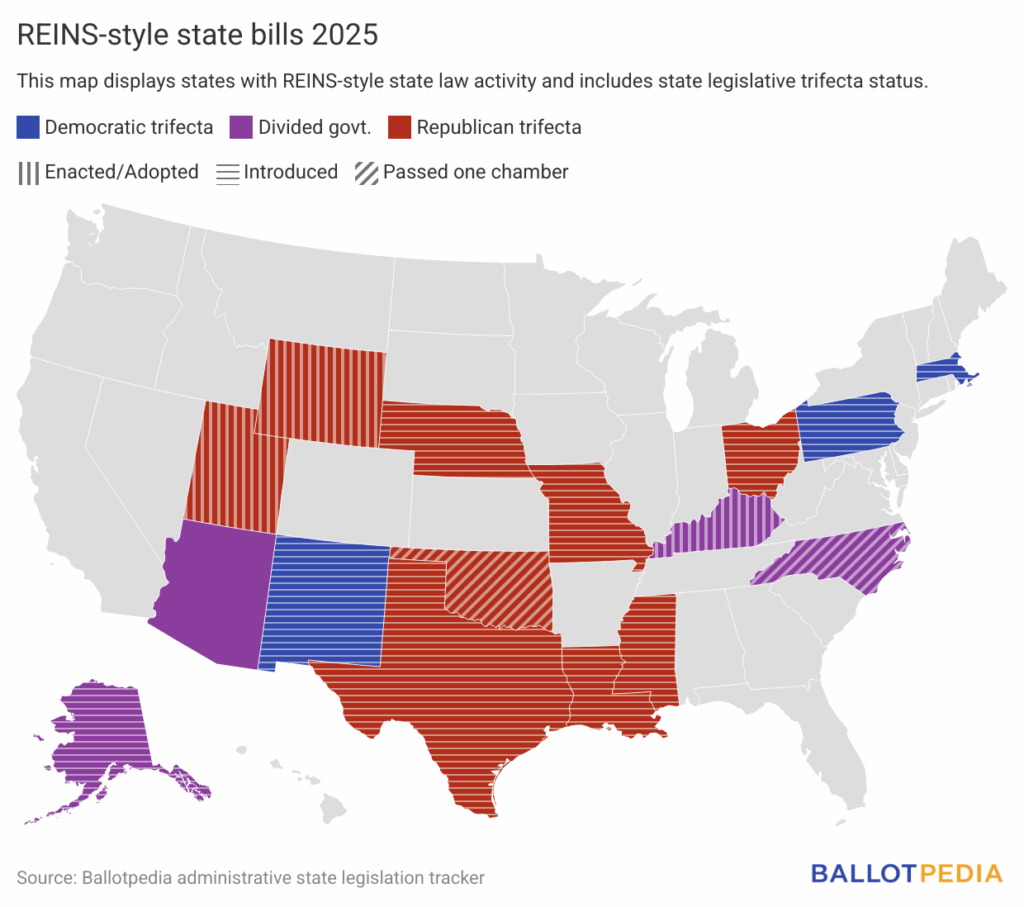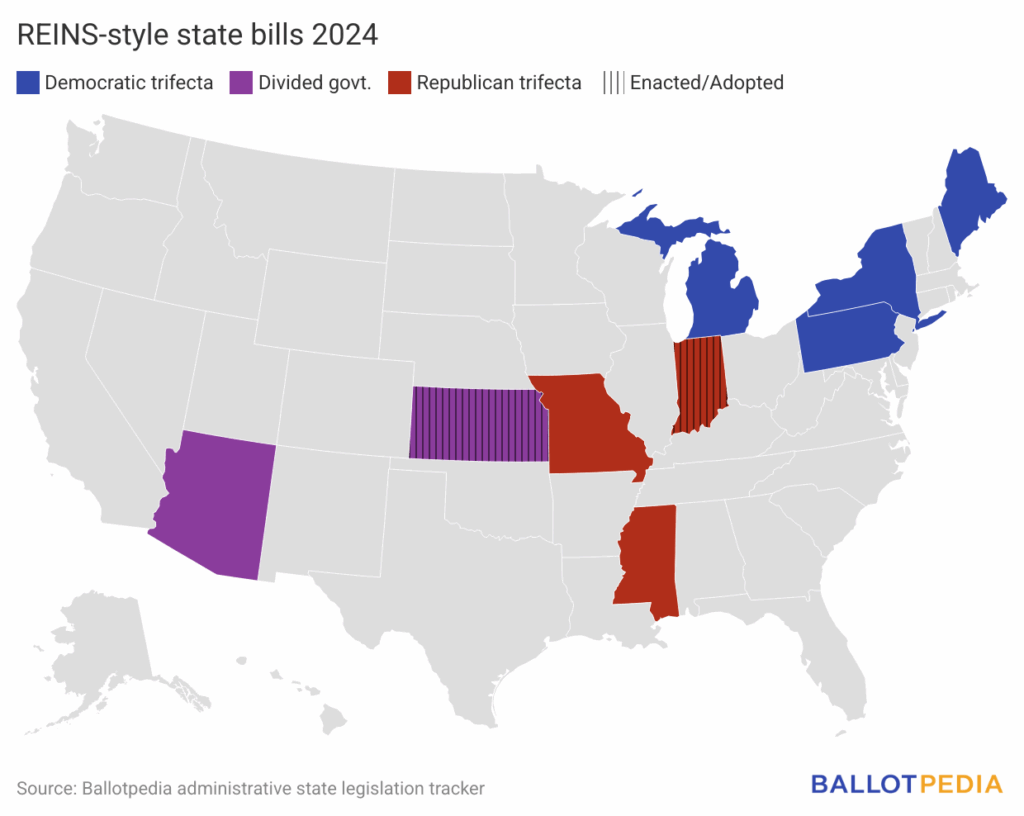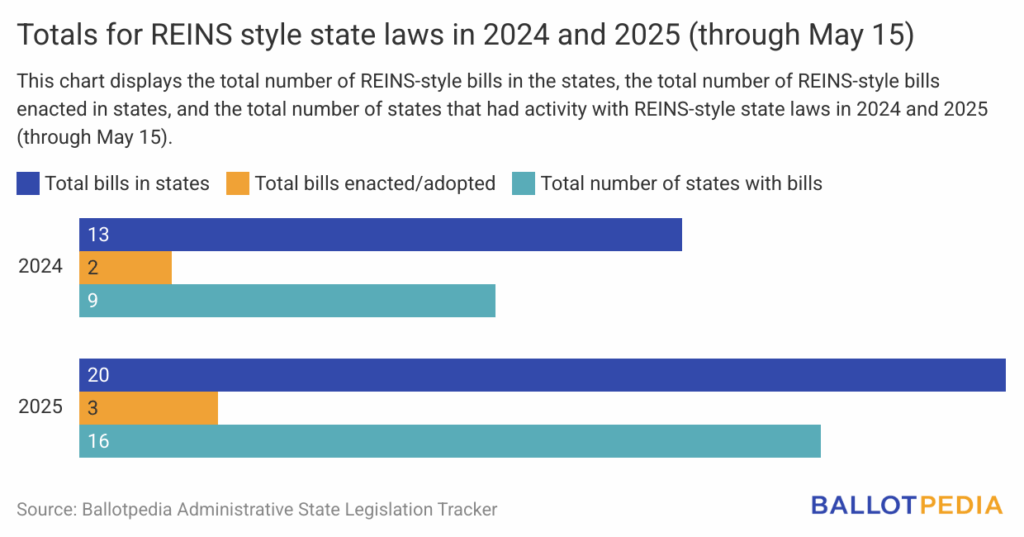What’s the story?
The North Carolina House passed House Bill 402, named the NC REINS Act, on April 16, 2025, by a vote of 68-44. The bill would increase legislative oversight of proposed agency regulations. It was scheduled for a May 21 hearing before the Senate Regulatory Reform Committee.
HB 402 would make any regulation with an economic impact of $1 million or more over 12 months subject to a legislative disapproval process. Under this process, any legislator could introduce a bill to disapprove the regulation. If the disapproval bill passes, the regulation would be blocked from taking effect. Additionally, HB 402 would modify how economic impact is calculated for proposed rules that amend or readopt existing regulations. Agencies would be required to estimate the baseline cost of the existing rule, and the total economic impact would then be determined by combining the baseline cost with any additional costs resulting from the proposed rule’s implementation.
The bill would also require administrative law judges (ALJ) to exercise independent judgment when deciding contested cases instead of deferring to agency legal interpretations. In appeals of ALJ decisions, the bill would require superior court judges to also exercise independent judgment when reviewing a case.
HB 402 is named the NC REINS Act, which stands for Regulations from the Executive in Need of Scrutiny. There is a legislative proposal at the federal level to increase congressional oversight of federal agency rulemaking that is also called the REINS Act. The process proposed in HB 402 differs from the federal REINS Act, which would require congressional approval of certain major agency rules before they could take effect. Under North Carolina HB 402, legislators would have a mechanism to disapprove and halt implementation of a rule, but would not be required to approve or review all proposed major rules before they went into effect. The federal REINS Act defines major agency regulations as those that have annual financial impacts on the U.S. economy of $100 million or more, increase consumer prices, or have significant harmful effects on the economy.
North Carolina has a divided government, with the state House and state Senate controlled by Republicans and a Democratic governor.
Where's the fight?
Bill sponsor Rep. Allen Chesser II (R) said, “Right now, unelected bureaucrats can impose regulations with major financial consequences without direct oversight from the General Assembly. The current process is not transparent. We can do better."
Sen. Steve Jarvis (R) said, “I’ve spent over 30 years in the building industry, and I’ve seen how heavy handed rules can weigh down hard working folks. It [NC REINS Act] ensures that the General Assembly maintains the authority to approve those rules, not an unaccountable bureaucrat tucked away somewhere in an agency office.”
Rep. Pricey Harrison (D) opposed the bill, stating that outside interests could have undue influence on the legislative review process. “You try and do something, and the legislature gets influenced by some special interest. It doesn’t want that rule. And then this is what’s going to happen now,” she said.
North Carolina's Dept. of Health and Human Services wrote in a letter to the House Regulatory Reform Committee that a REINS mechanism could delay important public health rulemaking. DHHS said, "This proposed legislation creates inefficient operational burdens, and establishes ill-defined processes which would be virtually impossible to successfully complete, resulting in significantly delayed rulemaking, which could jeopardize health and safety and put NC business out of step with businesses nationally."
What's the background?
NC’s current Administrative Procedure Act requires state agencies to review their rules annually and repeal any rule identified as unnecessary, unduly burdensome, or inconsistent with relevant law. Proposed rules are reviewed by a 10-member Rules Review Commission appointed by the legislature.
The Office of State Budget Management found over the last five years, an average of 11 rules per year reached the $1 million estimated 12-month economic impact threshold in HB 402.
The NC General Assembly had a Republican veto-proof, three-fifths supermajority from April 2023 to January 2025 when the current members took office. Republicans gained their veto-proof supermajority in the House when Rep. Tricia Cotham (D) switched parties from Democrat to Republican in 2023, giving Republicans 72 seats out of 120. Republicans gained a veto-proof supermajority of three-fifths (30) senators in the 2022 election, going from 28 to 30 seats.
The North Carolina legislature overrode all 27 vetoes by former Gov. Roy Cooper (D) in 2024.
In the 2024 elections, Republicans lost one seat in the House, which ended their supermajority control. Without it in 2025, any future veto override attempt would require support from at least one House Democrat. Republicans retained control of 30 Senate seats in the 2024 elections.
REINS and administrative state legislation in NC
In North Carolina's 2025 legislative session, 18 bills related to the administrative state have been introduced or passed by one of its legislative chambers. None have passed both chambers or been enacted. In addition to the REINS Act, four North Carolina bills have passed one chamber. These include SB 574, the DAVE Act, which would establish a state department modeled on the federal DOGE (Department of Government Efficiency).
State REINS-style laws in 2024-2025
Ballotpedia tracks legislation such as NC HB 402 as part of our analysis of the administrative state. REINS-style state laws are a type of legislative oversight over agency rules. It falls in Ballotpedia's legislative control pillar, which focuses on the balance of power between administrative agencies and the legislative branch. The legislative control pillar is one of the five pillars Ballotpedia uses to understand the administrative state.
In 2025, Ballotpedia is tracking 20 REINS-style bills or other bills increasing legislative oversight based on an economic impact threshold in 16 states. Three states have enacted these bills in 2025 so far: Kentucky, Utah, and Wyoming.
On March 27, 2025, both chambers of the Kentucky General Assembly voted to override Gov. Andy Beshear's (D) veto of House Bill 6, the REINS-style bill in Kentucky. Because of an emergency clause, HB 6 went into immediate effect. Beshear then filed suit on March 28, 2025, to block it.
In Wyoming, the Legislature overrode Governor Mark Gordon (R)'s veto of Wyoming Senate File (SF) 0127 on March 6, 2025, after Gordon’s March 4, 2025, veto.
The map below displays REINS-style state bills in 2025.

In 2024, Ballotpedia tracked 13 REINS-style laws or similar laws that increased, but did not require, legislative oversight in 9 states, with 2 bills being enacted.
The Arizona State Senate and the state House passed SCR 1012, which placed a ballot measure to require legislative approval of proposed rules expected to have an economic impact of over $500,000 within five years of implementation on the ballot for voters to decide. The measure SCR 1012 put on the ballot, Arizona proposition 315, was defeated on November 5, 2024.
Indiana and Kansas enacted legislation. Kansas’ law took effect after the House voted 87-38 and the Senate voted 27-12 to override Gov. Laura Kelly’s (D) veto of HB 2648.
The map below displays states with REINS-style bills in 2024.

The chart below displays a comparison of REINS-style state law activity in 2024 and 2025.

Want to go deeper?



